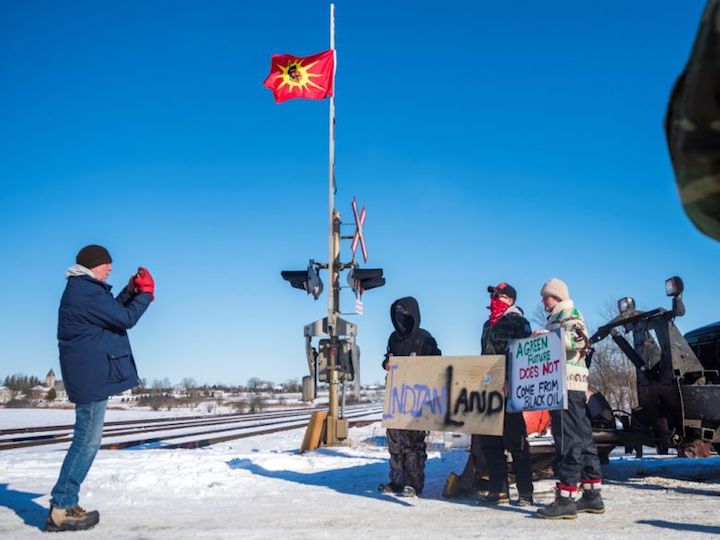CN Rail shipments disrupted on escalating pipeline protests
Canadian National Railway Co. said it will have to shut down “significant” parts of its network as an Indigenous protest against a west coast pipeline escalates, the latest backlash against the country’s oil and gas industry.

Blockades near Belleville, Ontario, and between Prince George and Prince Rupert in British Columbia, have already disrupted passenger traffic as well as shipments of grain, propane, lumber and consumer goods, according to a company statement Tuesday. The Port of Prince Rupert in B.C. is effectively already shut down and ports in Montreal and Halifax are also feeling the impact with hundreds of trains canceled since the protest began last week.
“It’s not just passenger trains that are impacted by these blockades, it’s all Canadian supply-chains,” Jean-Jacques Ruest, chief executive officer of CN Rail, Canada’s largest railway company, said in the statement. “We are currently parking trains across our network, but due to limited available space for such, CN will have no choice but to temporarily discontinue service in key corridors unless the blockades come to an end.”
Political Minefield
The protesters are supporting the Wet’suwet’en Nation, an Indigenous group which opposes the construction of TC Energy Corp.’s planned C$6.6 billion Coastal GasLink project. The pipeline would carry gas from Western Alberta to Kitimat, B.C. to supply a liquefied natural gas project. KKR & Co. and Alberta Investment Management Corp. agreed to buy a 65% stake in the project in a deal expected to close in June.
Ruest said the company has obtained court injunctions for both locations and is working with local enforcement agencies to enforce the orders.
Canada’s oil and gas industry, and the pipelines that carry its output, has been the target of a rising protest movement, including opposition to the Trans Mountain and Keystone XL conduits. It’s creating a political minefield for Prime Minister Justin Trudeau as he tries to plot a way forward for an industry plagued with bottlenecks while fulfilling his promise to reduce Canada’s carbon emissions.
Trudeau’s government bought the Trans Mountain project in 2018 as a way to get Canada’s crude to tidewater and faces another stark decision in the weeks ahead on whether to approve Teck Resources Ltd.’s C$20 billion Frontier oil-sands mines.
Passenger Traffic
Indigenous youth and their allies occupied the Ministry of Justice building in Ottawa to support the protest, calling on the government to intervene against “rights violations” taking place in Wet’suwet’en territory.
The Western Canadian oil patch has grown increasingly reliant on rail to get crude, Canada’s biggest export, to refiners as far away as the U.S. Gulf Coast.
Canadian National expects to be shipping 250,000 barrels a day by the end of the first quarter, up from 180,000 barrels a day in September, the company said last month. It shipped 36,000 carloads in fourth quarter—the most in the company’s history.
In addition to CN Rail, a commuter train service run by Via Rail between Montreal and Toronto and Ottawa and Toronto have been impacted in both directions due to the Belleville blockade.
The Canadian Manufacturers and Exporters group urged government officials to work with law enforcement to take the appropriate steps to allow commercial and passenger rail service to be restored, the organization said in a statement today. “The negative impacts of the interruptions, which has been on-going for six days, are having a real effect on the economy, and are already being felt throughout the manufacturing supply chain.”
CN Rail transports more than C$250 billion worth of goods annually across a rail network of approximately 20,000 route-miles spanning Canada and mid-America.
Similar Stories
INVESTING IN AMERICA: Biden-Harris Administration announces $635 Million to continue expanding zero-emission EV charging and refueling infrastructure
New investments from the Bipartisan Infrastructure Law will add more than 11,500 electric vehicle charging ports and expand hydrogen and natural gas fueling infrastructure in communities nationwide
View Article
Consolidated Chassis Management expands leadership team with four key hires
View Article
CMA CGM Brazil enhances its intermodal sustainable solutions
View Article
AAR reports rail traffic for the week ending January 04, 2025
View Article
ATDA members vote to ratify national agreement with NCCC
View Article
Savage Wellington Transload Terminal to provide Utah crude-by-rail connection
View ArticleGet the most up-to-date trending news!
SubscribeIndustry updates and weekly newsletter direct to your inbox!





